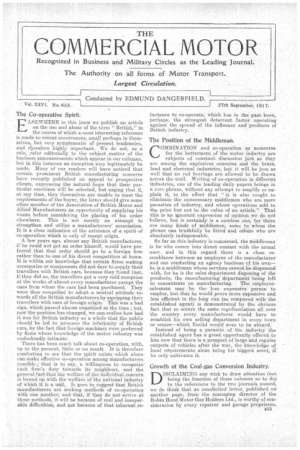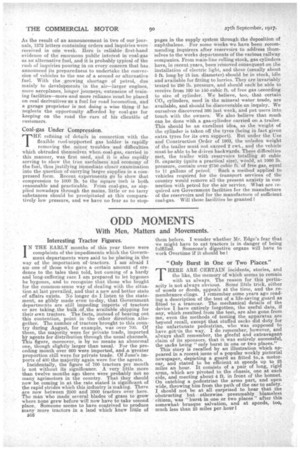The Co-operative Spirit.
Page 1

Page 2

If you've noticed an error in this article please click here to report it so we can fix it.
E-'4LSEWHERE in this issue we publish an article on the Use and abuse of the term "British," in the course of which a most interesting reference
is made to recent occurrences, small perhaps in themselves, but very symptomatic of present tendencies, and therefore highly importantWe do not, as a rule, .refer editorially to the subject matter of the business announeements which appear in our eolumns, but in this instance an exception may legitimately be made. Many of our readers will have noticed that certain prominent British manufacturing concerns have recently published an appeal to prospective clients, expressing the natural hope that their particular machines will be selected, but urging that if, at any time, they themselves are unable to nieet the requirements-of-the buyer, the latter should give some other member of the Association of British Mator. and Allied Manufacturers an opportunity of supplying his wants before .considering the placing of his order else-where. This is not merely an attempt to strengthen and utilize a manufacturers' association. It is a clear indication of the existence of a spirit of co-operation which is only of recent .origin.
A few years ago, almost any British manufacturer,
if he Could not get an order himself, would have preferred that that order should go to a foreign firm rather than to one of his direct competitors at home. It is within our knowledge that certain firms making accessories or 'components did not dare to supply their travellers with British cars, because they found that, if they did so, the travellers got a very cold reception at the works of almost every manufacturer except the cues from whom the cars had been purchased. They were thus compelled to adopt a neutral attitude towards all the British 'manufacturers by equipping their travellers with cars of foreign origin. This was a bad sign, which passed almost unnoticed at the time ; but, now the position haschanged, we canrealize how had it was for British industry as a whole that the public. should be lea to presume the inferiority of British cars, by the fact that foreign machines were preferred by firms whose knowledge of the motor industry was und-oubtedly intim.ate.
'There has been much talk about co-operation, with, up to the present, little or no result. It is therefore comforting to see that the spirit exists which alonecan [make effective co-operation among manufacturers possible ; that is to say, a willingness to recognize' each firm's duty towards its neighbour, and the general fact that the welfare of the.individual.concern is bound up with the W elf are of the national industry of which it is a unit. It goes to suggest that British manufacturers are Seeking 'methods el co-operation with one another, and that, if they do not arrive at those methods, it will be because of real and insuperable difficulties, and not because of that inherent re
luctance to co-operate, which has in the past been, perhaps, the strongest deterrent factor operating against the spread of the influence and products of British industry.
The Position of the Middleman.
OMBINATION and co-operation as measures for the betterment of the motor industry are subjects of constant discussion just as they are among the explosives concerns and the brass, lead and electrical industries, but it will be just as well that no red herrings are allowed to be drawn across the trail. Writing of co-operation in different industries, one of the leading daily papers brings in a curt phrase, without any attempt to amplify or explain it, to the effect that "it is also sought to eliminate the unnecessary middlemen who are mere parasites of industry, and whose operations add to the price but not to the value of an article." That this is an ignorant expression of opinion we do not believe, but it certainly is a careless one, for there are many kinds of. middlemen some to. whom the phrase can truthfully be fitted and others who are absolutely indispensable. . .
So far as this industry is. concerned, the middleman
is he who comes into direct contact with the actual user, and in this regard . there is a close resemblance between an employee of . the manufa.cturer and one conducting an agency business of his own— he is a middleman whose services cannot be dispensed with, for he is the sales department disposing of the products, the manufacturing department being left to concentrate on manufacturing. The employeesalesman may be the loss expensive person to employ, but that he would prove more expensive and less efficient in the long run (ascompared with the established agent) is demonstrated by the obvious fact that to secure the same representation all over the country every manufacturer, would: have to establish his own selling department in every town. or centre—which Euclid would aver, to be absurd.
Instead of being a parasite of the 'industry the established agent has a great opportunity offered to him now that there is a prospect of large and regular outputs of vehicles after the war, the knowledge of local requirements alone being his biggest asset, if he only cultivates it.
Growth of the Coal-gas Conversion Industry.
DISCLAIMING any wish to draw attention (not being the function of these columns so to do) to the references to the two journals named, we do think that an unsolicited letter, published on another page, from the managing director of the Robin Hood Motor Gas Holders Ltd., is worthy of consideration by every repairer and garage proprietor.. As the result of an announcement in two of our journals, 1372 letters containing orders and inquiries were received in one week. Here is reliable first-hand evidence of the enormous public interest in coal-gas as an-alternative fuel, and it is probably typical of the rush of inquiries pouring in on every concern that has announced its preparedness to undertake the convefsion of vehicles to the use of a second or alternative fuel. With the -growing shortage of petrol, due mainly to developments in the air—larger engines, more aeroplanes, longer journeys; extension of training facilities—more and more reliance mustbe placed on coal derivatives as a fuel for road locomotion, and a garage proprietor is not doing a wise thing if he neglects the opportunity afforded by coal-gas for keeping on the road the cars of his clientele of C ustomers.
Coal-gas Under Compression.
THE refining of details in connection with the flexible roof-supported gas holder is rapidly removing the. minor, troubles and difficulties which obtruded themselves whencoal-gas, carried in this manner, was first used, and it is also rapidly serving to show the true usefulness and economy of the fuel, thus justifying immediate closer examination into the question of -carrying larger supplies in a compressed form. Recent experimentS go fo show that : compression to 1000 lb. to the square inch is both reasonable and practicable. From coal-gas, as supplied nowadays through the mains, little or no tarry substances should be precipitated at this comparatively low pressure, and we have no fear as to stop pages in the supply system through the deposition of naphthalene. For some weeks we have been recommending inquirers after reservoirs to address themselvea to the works departments of the various railway companies. From main-line rolling stock, gas cylinders have, in recent years, been removed consequent on the installation of electric light, and these (usually about 6 ft. long by 15 ins. diameter) should be in stock, idle and available for fitting to lorries. They are invariably tested to 250 lb. pressure, and should each be able to receive from 120 to 150 cubic ft. of free gas Eccording to size of 'cylinder. We believe, too,. that certain CO2 cylinders, used in the mineral water trade, are available, and should be discoverable on inquiry. We ourselves discovered 366 last week, and put users into touch with the owners. We also believe that much can be done with a gas-cylinder carried on a trailer. This should be an excellent idea, as the weight of the cylinder is taken off the tyres (being in fact given extra tyres for its own support). But under the Use and Construction Order of 1903, the unladen weight of the trailer must not exceed 2 cwt., and the vehicle must be able to be di iven backwards. These difficulties met, the trailer with reservoirs totalling 40 cubic ft. capacity (quite a practical size), would, at 1000 lb. pressure, contain over 2750 cubic ft. of free gas, equal to 11 gallons of petrol. Such a method applied to vehicles required for the transport services of the country would remove all the present anxiety in connection with petrol for the air service. What are required are Government facilities for the manufacture of the reservoirs and for the manufacture of sufficient coal-gas. Will those facilities be granted?






















